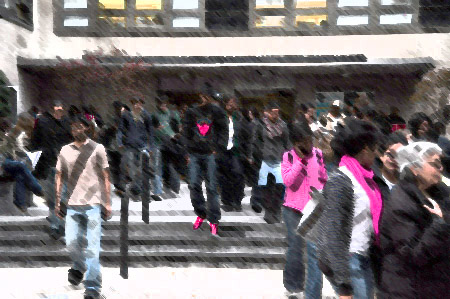The battle in D:F/M over the direction of the journalism curriculum (reflecting the many conflicts of the internecine war of several years also ongoing in D:F/M) forced me into a publish or perish mode. This series is one of the results.

"Students in important areas of learning are more sophisticated and savvy than Colleagues give them credit. Are my Colleagues really that obstinate about teaching and learning?
I) D:F/M needs a course that serves as a portal for journalism just like the ones for media and film. That is, to major and to take classes in the department, students must take a portal class. I’ve reviewed Media 180 as taught by Bob Stanley and Peter Parisi. It has been for years the required course for students interested in majoring in media and taking J- classes.
I proposed a long time ago that there should be a another portal class. Without going into detail, two Colleagues sabotaged a good idea, substituting this course, Journalism and Society, an elective class which is not portal and is basically a media course posing as a journalism class. It lacks breadth and the first two de-emphasize journalism way too much.
Statements at the last meeting that journalism was essentially relegated to one lecture in a 15-week semester because the profession is regarded with contempt and is going out of business (I guess that means Democracy, too), is savagely revealing of the level of thinking in F/M regarding journalism. That is, the level of thinking has lacked the critical and intellectual depth that I’ve heard colleagues say that they want in the curriculum. So: I strongly suggest a portal level “Journalism and Mass Media” or “Journalism and Mass Communication” with the emphasis on journalism (without ignoring its interconnections/workings with film, advertising, public relations and other forms of media).
Students should come into the news writing courses with some advanced knowledge that include such topics and issues as Community Journalism, Citizen Journalism and the role of weeklies, especially in New York City, from the corporate-own chains, like the “recent” Murdoch acquisitions, to the independents and free ones. Students should also have some awareness of ethnic/immigrant news publications and issues as well as evolving forms of journalism, such as blogging and video-blogging and some students would argue that the social networking sites are journalistic (I don’t think so but they do and, who knows, such sites might morph into a real journalism form).
Some colleagues were involved in the recent Grassroots Media Conference but except for one course, that’s Professor Stein’s, I don’t see anything from that conference reflected in F/M curriculum. I’m not saying that it should be or shouldn’t be though in a J/Mass Com class it could be.
Students should be aware of trade publications (AKA business-to-business media), newsletters, etcetera. Neighborhood cable TV access channels are very progressive and have journalistic programming but are in no way on the radar of department curriculum as they should be in terms of what role they play in NYC and what roles they can play in helping students prepare for internships and jobs.
I’ve left out a lot but not so much that an introductory course couldn’t accommodate. And, yes, the portal class should address the crisis in journalism which was so poorly articulated in our last [faculty] meeting.
End of Part 2
Tags: Crisis in Journalism, Crisis in journalism education
This entry was posted on Tuesday, January 4th, 2011 at 11:00 am and is filed under Blogroll, Journalism, Journalism Education, News/Commentary/Opinion, State of Journalism, Student Journalism. You can follow any responses to this entry through the RSS 2.0 feed.
Both comments and pings are currently closed.
Crisis in Journalism: A Microcosm – 2
The battle in D:F/M over the direction of the journalism curriculum (reflecting the many conflicts of the internecine war of several years also ongoing in D:F/M) forced me into a publish or perish mode. This series is one of the results.
"Students in important areas of learning are more sophisticated and savvy than Colleagues give them credit. Are my Colleagues really that obstinate about teaching and learning?
End of Part 2
Tags: Crisis in Journalism, Crisis in journalism education
This entry was posted on Tuesday, January 4th, 2011 at 11:00 am and is filed under Blogroll, Journalism, Journalism Education, News/Commentary/Opinion, State of Journalism, Student Journalism. You can follow any responses to this entry through the RSS 2.0 feed. Both comments and pings are currently closed.